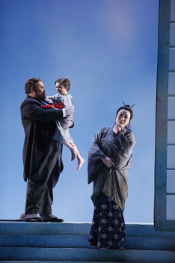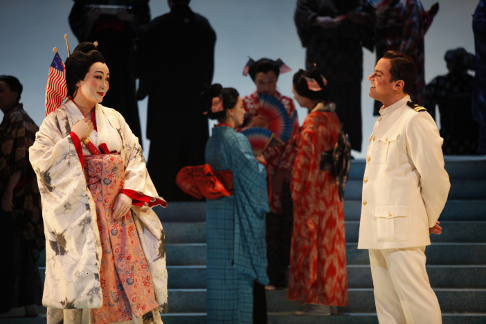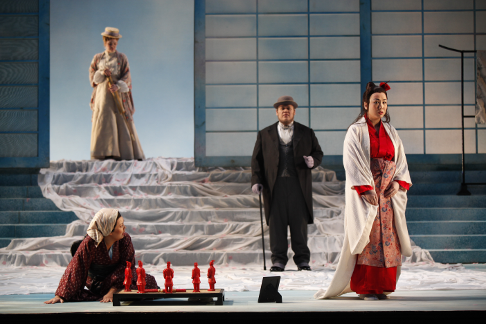![Shu-Ying Li as Cio-Cio-San [Photo by Carol Rosegg courtesy of New York City Opera]](http://www.operatoday.com/2010Butterfly0048.png)
29 Mar 2010
Madama Butterfly, NYCO
Once again, as in L’Etoile, Mark Lamos’s staging and Robert Wierzel’s lighting nearly steal the show in the City Opera’s revival of Madama Butterfly.
English Touring Opera are delighted to announce a season of lyric monodramas to tour nationally from October to December. The season features music for solo singer and piano by Argento, Britten, Tippett and Shostakovich with a bold and inventive approach to making opera during social distancing.
This tenth of ten Live from London concerts was in fact a recorded live performance from California. It was no less enjoyable for that, and it was also uplifting to learn that this wasn’t in fact the ‘last’ LfL event that we will be able to enjoy, courtesy of VOCES8 and their fellow vocal ensembles (more below …).
Ever since Wigmore Hall announced their superb series of autumn concerts, all streamed live and available free of charge, I’d been looking forward to this song recital by Ian Bostridge and Imogen Cooper.
The Sixteen continues its exploration of Henry Purcell’s Welcome Songs for Charles II. As with Robert King’s pioneering Purcell series begun over thirty years ago for Hyperion, Harry Christophers is recording two Welcome Songs per disc.
Although Stile Antico’s programme article for their Live from London recital introduced their selection from the many treasures of the English Renaissance in the context of the theological debates and upheavals of the Tudor and Elizabethan years, their performance was more evocative of private chamber music than of public liturgy.
In February this year, Albanian soprano Ermonela Jaho made a highly lauded debut recital at Wigmore Hall - a concert which both celebrated Opera Rara’s 50th anniversary and honoured the career of the Italian soprano Rosina Storchio (1872-1945), the star of verismo who created the title roles in Leoncavallo’s La bohème and Zazà, Mascagni’s Lodoletta and Puccini’s Madama Butterfly.
Evidently, face masks don’t stifle appreciative “Bravo!”s. And, reducing audience numbers doesn’t lower the volume of such acclamations. For, the audience at Wigmore Hall gave soprano Elizabeth Llewellyn and pianist Simon Lepper a greatly deserved warm reception and hearty response following this lunchtime recital of late-Romantic song.
Collapsology. Or, perhaps we should use the French word ‘Collapsologie’ because this is a transdisciplinary idea pretty much advocated by a series of French theorists - and apparently, mostly French theorists. It in essence focuses on the imminent collapse of modern society and all its layers - a series of escalating crises on a global scale: environmental, economic, geopolitical, governmental; the list is extensive.
For this week’s Live from London vocal recital we moved from the home of VOCES8, St Anne and St Agnes in the City of London, to Kings Place, where The Sixteen - who have been associate artists at the venue for some time - presented a programme of music and words bound together by the theme of ‘reflection’.
'Such is your divine Disposation that both you excellently understand, and royally entertaine the Exercise of Musicke.’
Amongst an avalanche of new Mahler recordings appearing at the moment (Das Lied von der Erde seems to be the most favoured, with three) this 1991 Mahler Second from the 2nd Kassel MahlerFest is one of the more interesting releases.
‘And there was war in heaven: Michael and his angels fought against the dragon; and the dragon fought and his angels, And prevailed not; neither was their place found any more in heaven … that old serpent … Satan, which deceiveth the whole world: he was cast out into the earth, and his angels were cast out with him.’
If there is one myth, it seems believed by some people today, that probably needs shattering it is that post-war recordings or performances of Wagner operas were always of exceptional quality. This 1949 Hamburg Tristan und Isolde is one of those recordings - though quite who is to blame for its many problems takes quite some unearthing.
There was never any doubt that the fifth of the twelve Met Stars Live in Concert broadcasts was going to be a palpably intense and vivid event, as well as a musically stunning and theatrically enervating experience.
‘Love’ was the theme for this Live from London performance by Apollo5. Given the complexity and diversity of that human emotion, and Apollo5’s reputation for versatility and diverse repertoire, ranging from Renaissance choral music to jazz, from contemporary classical works to popular song, it was no surprise that their programme spanned 500 years and several musical styles.
The Academy of St Martin in the Fields have titled their autumn series of eight concerts - which are taking place at 5pm and 7.30pm on two Saturdays each month at their home venue in Trafalgar Square, and being filmed for streaming the following Thursday - ‘re:connect’.
The London Symphony Orchestra opened their Autumn 2020 season with a homage to Oliver Knussen, who died at the age of 66 in July 2018. The programme traced a national musical lineage through the twentieth century, from Britten to Knussen, on to Mark-Anthony Turnage, and entwining the LSO and Rattle too.
With the Live from London digital vocal festival entering the second half of the series, the festival’s host, VOCES8, returned to their home at St Annes and St Agnes in the City of London to present a sequence of ‘Choral Dances’ - vocal music inspired by dance, embracing diverse genres from the Renaissance madrigal to swing jazz.
Just a few unison string wriggles from the opening of Mozart’s overture to Le nozze di Figaro are enough to make any opera-lover perch on the edge of their seat, in excited anticipation of the drama in music to come, so there could be no other curtain-raiser for this Gala Concert at the Royal Opera House, the latest instalment from ‘their House’ to ‘our houses’.
"Before the ending of the day, creator of all things, we pray that, with your accustomed mercy, you may watch over us."
![Shu-Ying Li as Cio-Cio-San [Photo by Carol Rosegg courtesy of New York City Opera]](http://www.operatoday.com/2010Butterfly0048.png)
Once again, as in L’Etoile, Mark Lamos’s staging and Robert Wierzel’s lighting nearly steal the show in the City Opera’s revival of Madama Butterfly.
It says a great deal in her favor that in her sensitive and passionate account of the title role, Shu-Ying Li holds her own against such competition. For example, a great circle dominates the backdrop — red against white for the rising sun or the Japanese flag as the opera opens, turning black against red when the Bonze denounces his errant niece for renouncing her ancestral gods, then white against serene blue for moonlight during the great duet that closes the act.
 Quinn Kelsey as Sharpless, Eddie Schweighardt as Sorrow and Shu-Ying Li as Cio-Cio San
Quinn Kelsey as Sharpless, Eddie Schweighardt as Sorrow and Shu-Ying Li as Cio-Cio San
There are few props on the wide, bare stage, and therefore those we see
possess greater significance. The tiny ancestral gods that Pinkerton scorns as
“dolls” are placed stage center, as on an altar, during later acts
of the story — first for Butterfly to ignore them, preferring the
wide-awake American god, then for her to atone before them by hara-kiri when
she has lost honor, child and everything else. A fleet of tiny red
“warships” floats like a flock of birds above the stage at
curtain-rise — to be echoed in Act II by the toy ship Sorrow plays with.
A telescope is not merely functional, permitting Butterfly to stare at the
empty harbor of Nagasaki, but also symbolizes her undying hopes.
The traditional screen behind which the heroine kills herself does not appear — instead she shows her gumption (and forfeits a pathos playwright David Belasco and composer Puccini both wished to claim) by turning about to slash her throat in her faithless lover’s face, precisely as Pinkerton enters and after his desperate, perhaps repentant cries of “Butterfly!” This confrontational death is an excess. Butterfly, as Belasco and Puccini conceived her, may be a convenient myth, a construction of the guilty Western colonialist conscience, but that is how they created her; to turn her final act into an expression of vendetta, a spitting in the face of her oppressor — the man she has entirely loved hitherto — seems an intrusive modern afterthought. We may have been patronizing when we took Cio-Cio-San to our hearts — but this resentful figure, this image of hate, will not win our hearts at all.
 Shu-Ying Li as Cio-Cio San and Steven Harrison as B.F. Pinkerton
Shu-Ying Li as Cio-Cio San and Steven Harrison as B.F. Pinkerton
Shu-Ying Li has a large and genuine Puccini soprano of great beauty, but there is a certain unsteadiness until it warms up. Her entrance was not luminous, but the duet was, and many other soaring phrases as well. Her Cio-Cio-San was a complete portrait, each line part of the whole, not the collection of pretty excerpts it can become. She is a tall woman and does not move like a small one, and in her enormous wedding kimono she all but dwarfs her Pinkerton, but the robe is soon removed — it is present, hanging on rods, for the rest of the opera, a visible symbol of her past — and in slimmer robes she manages to appear becomingly frail.
 Jessica Klein as Kate Pinkerton, Nina Yoshida Nelsen as Suzuki, Quinn Kelsey as Sharpless, and Shu-Ying Li as Cio-Cio San
Jessica Klein as Kate Pinkerton, Nina Yoshida Nelsen as Suzuki, Quinn Kelsey as Sharpless, and Shu-Ying Li as Cio-Cio San
Broad-shouldered Steven Harrison was, like most modern Pinkertons, cast in the shade by his Butterfly. The role may be thankless, an exemplary cad, but he should be a robust cad and Harrison sounded provincial. Nina Yoshida Nelsen sang an effective Suzuki, especially impressive in the Flower Duet and the penultimate trio. Quinn Kelsey’s Sharpless possessed — not only because of his size — a real presence, so that one accepted the judgments of this involved, sympathetic observer as more than the official boilerplate they can seem. Little Eddie Schweighardt made one of the liveliest Troubles I’ve seen, whacking Jeffrey Halili’s Goro with a fan and chasing about the stage with his toy boat.
George Manahan drew a precise and lustrous account of the score from his orchestra, full of Italian Wagnerism in the way melodies were foreshadowed, then foregrounded, then fragrantly recollected to remind us of joys past or hint at doom to come.
John Yohalem